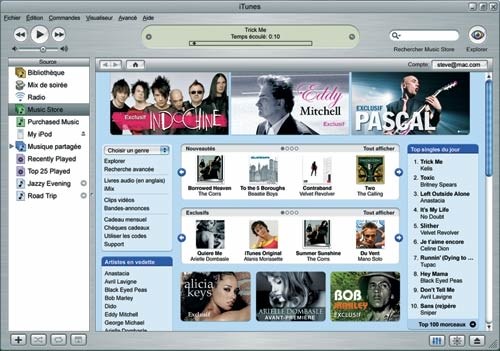
CARDIFF, Wales – When it comes to music collections, size matters.
Apple boasts about putting 10,000 songs in music fans’ pockets, but disgruntled British iTunes Music Store customers say Steve Jobs’ service just doesn’t measure up.
Jobs last week fronted a high-profile European launch for the popular download service, but was forced to go live without dozens of key artists such as The Strokes and The White Stripes, after falling out with the continent’s acclaimed independent labels.
Negotiations broke down on the eve of the debut, and Apple still hasn’t been able to offer an online licensing deal deemed acceptable to the indies, which make up a quarter of all European music sales.
The Association of Independent Music, which represents 820 U.K. labels, does not want its members to commit to the three-year, fixed-income deal it said is on the table.
‘The independent sector is keen to license to as many new services as possible, but never in a million years will we sign up to an online deal that isn’t as good as the deals we already have offline,’ AIM’s Sam Shentob said. ‘In a year or so, they may decide to increase their prices – but all that extra markup would go to Apple (and not to the labels). We are not going to throw our music away. The terms are simply unviable.’
Thousands of artists from across Europe are missing from iTunes Music Store as a result, he said. While Apple’s American iTunes offers 500 indie labels, Europe’s has ‘dozens,’ according to Jobs. In fact, homegrown favorites like Franz Ferdinand and Radiohead are available stateside, but not on the bands’ side of the pond.
Angered, many consumers have turned the iTunes software against its maker in a public demonstration against the shortage. Using the music service’s built-in playlist-sharing feature, they have created iMixes with titles like ‘iTunes needs more indies!’ Other users have used the song-ratings facility, designed to let listeners score each others’ taste in tunes, to vote the protest mixes to the very top of the iMix chart (iTunes software required) – an embarrassing marker of discontent.
‘Most of the music I want isn’t on iTMS!’ said the leading British playlist protestor, whose mix (iTunes software required) contains only Dire Straits’ ‘Money for Nothing.’ ‘Come on Apple, get it sorted or people like me are going to stop coming back. Great service, great software – lousy choice.’
A rock star in computer circles, Steve Jobs was hailed as the savior of the music industry when he convinced record label moguls to sign up to the original iTunes Music Store, which sold 70 million tracks in its first year and is praised for pioneering the legal-downloads business model.
But the outlet, boasting 700,000 available tracks, has arrived fashionably late to Europe, which is already crowded with rivals. Napster 2.0, Wippit, Peter Gabriel’s market-leading On Demand Distribution and even offerings from Coca-Cola and Oxfam all beat Apple across the Atlantic, and all have the indies on board.
‘Apple came to the market here very hastily and suddenly finds it has several competitors, which have been retailing for some months – it would have been better for them to wait for an agreement,’ said AIM Chief Executive Alison Wenham. In addition, Apple has offered the Big Five record labels more attractive terms.
Apple has denied that accusation, although its British headquarters did not respond to a request for comment.
Even with the difficulties, the store on Wednesday reported 800,000 European downloads in its first seven days – 450,000 of which were in the United Kingdom alone. By contrast, recent sales figures (PDF) showed British consumers bought 500,000 tracks online during the first five months of this year, before iTunes and Napster arrived.
‘In a very short period of time, Apple has established itself as the market leader in number of downloads,’ Jupiter Research analyst Mark Mulligan said. ‘Though the numbers are lower than the U.S.’ 3.5 million a week, 800,000 is unprecedented in the European market. We are seeing the surge of pent-up demand.
‘It is a shame there is independent catalog missing from the iTunes European stores but, ultimately, they will end up on the service. ITunes is too important for the independents not to be a part of and, likewise, the indies are too important for iTunes not to have them on board in the longer term. Right now, though, iTunes is doing very well without them.’